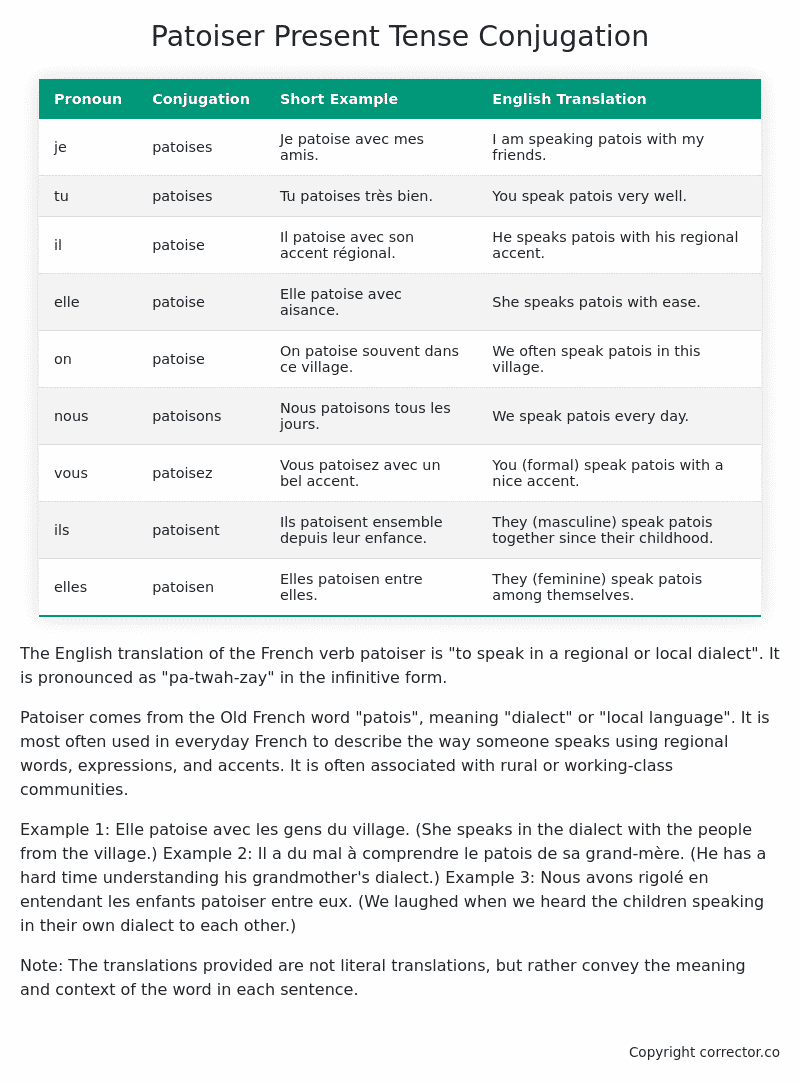Le Present (Present Tense) Conjugation of the French Verb patoiser
Introduction to the verb patoiser
The English translation of the French verb patoiser is “to speak in a regional or local dialect”. It is pronounced as “pa-twah-zay” in the infinitive form.
Patoiser comes from the Old French word “patois”, meaning “dialect” or “local language”. It is most often used in everyday French to describe the way someone speaks using regional words, expressions, and accents. It is often associated with rural or working-class communities.
Example 1: Elle patoise avec les gens du village. (She speaks in the dialect with the people from the village.)
Example 2: Il a du mal à comprendre le patois de sa grand-mère. (He has a hard time understanding his grandmother’s dialect.)
Example 3: Nous avons rigolé en entendant les enfants patoiser entre eux. (We laughed when we heard the children speaking in their own dialect to each other.)
Note: The translations provided are not literal translations, but rather convey the meaning and context of the word in each sentence.
Patoiser – About the French Present Tense
To take a deep dive into all the French tenses then see our article on Mastering French Tense Conjugation.
Common Everyday Usage Patterns For Le Present
Interactions with Other Tenses
Table of the Present Tense Conjugation of patoiser
| Pronoun | Conjugation | Short Example | English Translation |
|---|---|---|---|
| je | patoises | Je patoise avec mes amis. | I am speaking patois with my friends. |
| tu | patoises | Tu patoises très bien. | You speak patois very well. |
| il | patoise | Il patoise avec son accent régional. | He speaks patois with his regional accent. |
| elle | patoise | Elle patoise avec aisance. | She speaks patois with ease. |
| on | patoise | On patoise souvent dans ce village. | We often speak patois in this village. |
| nous | patoisons | Nous patoisons tous les jours. | We speak patois every day. |
| vous | patoisez | Vous patoisez avec un bel accent. | You (formal) speak patois with a nice accent. |
| ils | patoisent | Ils patoisent ensemble depuis leur enfance. | They (masculine) speak patois together since their childhood. |
| elles | patoisen | Elles patoisen entre elles. | They (feminine) speak patois among themselves. |
Other Conjugations for Patoiser.
Le Present (Present Tense) Conjugation of the French Verb patoiser (this article)
Imparfait (Imperfect) Tense Conjugation of the French Verb patoiser
Passé Simple (Simple Past) Tense Conjugation of the French Verb patoiser
Passé Composé (Present Perfect) Tense Conjugation of the French Verb patoiser
Futur Simple (Simple Future) Tense Conjugation of the French Verb patoiser
Futur Proche (Near Future) Tense Conjugation of the French Verb patoiser
Plus-que-parfait (Pluperfect) Tense Conjugation of the French Verb patoiser
Passé Antérieur (Past Anterior) Tense Conjugation of the French Verb patoiser
Futur Antérieur (Future Anterior) Tense Conjugation of the French Verb patoiser
Subjonctif Présent (Subjunctive Present) Tense Conjugation of the French Verb patoiser
Subjonctif Passé (Subjunctive Past) Tense Conjugation of the French Verb patoiser
Subjonctif Imparfait (Subjunctive Imperfect) Tense Conjugation of the French Verb patoiser
Subjonctif Plus-que-parfait (Subjunctive Pluperfect) Tense Conjugation of the French Verb patoiser
Conditionnel Présent (Conditional Present) Tense Conjugation of the French Verb patoiser
Conditionnel Passé (Conditional Past) Tense Conjugation of the French Verb patoiser
L’impératif Présent (Imperative Present) Tense Conjugation of the French Verb patoiser
L’infinitif Présent (Infinitive Present) Tense Conjugation of the French Verb patoiser
Struggling with French verbs or the language in general? Why not use our free French Grammar Checker – no registration required!
Get a FREE Download Study Sheet of this Conjugation 🔥
Simply right click the image below, click “save image” and get your free reference for the patoiser Present Tense tense conjugation!

I hope you enjoyed this article on the verb patoiser. Still in a learning mood? Check out another TOTALLY random French verb present conjugation!


